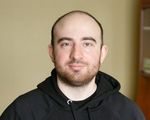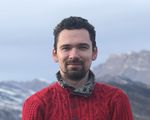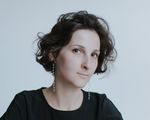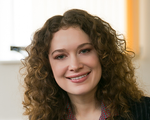About Success Builder
How do you find your place in life? How do you find something to do that both comes naturally to you and makes you happy? The answer is that you have to apply the knowledge you’ve gained from university and from life itself correctly. The Success Builder Project features HSE University graduates who have discovered themselves through an interesting business or an unexpected profession. The protagonists share their experiences and lessons learnt and talk about how they’ve made the most of the opportunities they were given.
Zhanna Medvedeva, graduate of the HSE Faculty of World Economy and International Affairs (WEIA), works as German space company Exolaunch’s Vice President for Launches and was recently named the 2021 Forbes ‘30 under 30’ winner in Science and Technology. In this interview with Success Builder, she explains how and where to study management for the space industry, who will ‘clean up’ near-earth orbits, what the New Space market is and how to develop it in Russia, and much more.
Did you wind up in the space industry by chance, or was it an interest of yours since childhood?
In my school years, I never imagined that I would one day be dealing with outer space. I had completely different goals and interests back then. I studied Chinese from the age of 12, before it became trendy, and it took us two months just to find a tutor. I entered HSE University in 2008 and planned to specialise in Chinese studies because Russian-Chinese relations were developing well at that time. I wanted to focus my knowledge on one of the more applied fields and so I chose a cutting-edge university that kept its finger on the pulse of world events and the global economy.
I pictured myself participating in global processes and taking part in international negotiations as a specialist with foreign language skills. I always viewed languages not as a goal, but as a means of communicating to carry out major projects. I entered the WEIA faculty with a focus on economics because I wasn’t very interested in politics and I wanted to be involved with implementing commercial projects in the future.
What changed when you saw all the hype connected with China?
I spoke Chinese fairly fluently when I came to HSE, whereas all my classmates were studying it from scratch. I was able to take it easy during Chinese classes and use that time to bone up on economic subjects that were more difficult for me. My bachelor’s years coincided with the rise of China, its growing influence on the world economy and the increased media coverage connected with that. We began our studies with a class on the Economy and Politics of China taught by Petr Mozias that introduced me to the country from different angles.
I consider Petr Mozias one of the best teachers. Students really loved his lectures and I would still love to go back and attend his classes again. We dove right into studying different sectors of the Chinese economy. And, because of the financial news at the time, I was interested in foreign direct investment in the Chinese economy and I wrote my term paper on it. After my second year, we had a research paper competition in which I won a one-year internship in China and went to study in Shanghai.
What was it like seeing the subject of your research with your own eyes?
I had been to China several times before to study the language, but I had always dreamed of going to Shanghai. Now, I was able to go. The university had placed me in the advanced group where I began studying business Chinese. Shanghai is a very dynamic and international city with a huge number of expats. It is also convenient to travel to other Chinese cities from there. I travelled south to Hong Kong, Macau, Shenzhen and Guangzhou. It was one of the best and most intense periods of my life. That year enabled me to see and learn more than I could have from afar and to think about what I wanted to do next.
And what thoughts did you have about your future?
The geopolitical situation was more favourable then and there were so many opportunities that it was difficult to settle on a particular company and industry. Representatives from Ernst & Young, McKinsey and KPMG often visited HSE and offered tempting and promising careers. But they needed applicants with good analytical skills, general erudition and strong English, not fluent Chinese. This didn’t fit my goals exactly.
I started looking at areas in which Russia and China were cooperating most actively at the time — oil and gas, the nuclear industry and space. Oil and gas struck me as too traditional, with a minimum of freedom and creativity.
The nuclear industry seemed to involve potential danger whereas space was romantic
More or less by chance, I wound up in a commercial structure of the Roscosmos state corporation dealing with Russian-Chinese cooperation in the civilian space industry. That was when I began learning about the space industry, practically from scratch.
Why did you take a year off before entering the master’s programme?
I really liked the work, which was inevitable, but I felt that my education was incomplete: I wanted a master’s degree. I also wanted to study under Alexey Mazlov, whose articles I had enjoyed reading and with whom I shared research interests in Sinology. The choice of a programme was also determined by the fact that there was no high-quality education in space industry management available at the time, only an empirical path that I still follow in my current job. I, therefore, allowed myself to continue doing what I liked most — at my favourite university and with the best instructors. And, as a result, I earned a master’s degree in Oriental Studies.
China is very much in the headlines now. Given that interest, aren’t you tempted to return to work connected with China?
It would be interesting to get back into that area, but unfortunately, geopolitical issues currently eclipse economic ones. I dealt with Russian-Chinese relations at Roscosmos in 2013-2014. However, it involved a lot of administrative work and I decided to switch to the department for launching small satellites, which are called secondary or piggyback payloads. That job was more dynamic because the department worked with private companies and engaged in commercial projects. What’s more, I arrived just as preparations were underway for the next launch campaign of the Soyuz-2 rocket and I was immediately invited to accompany the team to the Baikonur cosmodrome. I was thrilled.
Like any other HSE graduate, I was used to doing everything quickly and efficiently and in a competitive environment. So I was happy to switch over to working on commercial projects. I began by implementing the launch campaign at Baikonur for foreign clients. I handled communication with foreign technical specialists and coordinated the overall logistics. I immersed myself completely in the launch of small satellites and came to realise that this was a very unique and promising area. At that time, the New Space segment was only starting to pick up, and I was growing rapidly along with the market and our team.
Did you have the necessary training in this field, including in physics and technology?
No educational programme exists that prepares specialists specifically for what I am doing now. If I had graduated from Bauman Technical University, I would definitely be a good techie, but I probably wouldn’t have the skills needed to coordinate international commercial projects and I wouldn’t speak foreign languages so fluently.
It doesn’t take a rocket scientist to launch satellites into space
Not having a classical technical education has never been an obstacle for me. My team includes highly qualified engineers who handle the technical side of projects while I focus on overall project management and development of the business and commercial elements. I am responsible to build the business side of the project from scratch, to sign numerous contracts with both the customers and the providers of the launch, obtain licenses and organise the general logistics and communication. From the experience I now have, I understand how the project works from the engineering standpoint, how satellites are built and how the launch process works. You can only learn these things in practice and I am convinced that good fundamental education like that provided by HSE gives you the skills that make it possible to work with and qualitatively analyse information. Most important is the ability to analyse information at any level and to make the right decisions quickly.
What were your first professional duties in the space industry and what are ‘small satellites’?
I first worked with Glavcosmos, a division of Roscosmos responsible for international commercial projects. My job involved launching foreign satellites on Russian Soyuz-2 rockets flying out of the Baikonur and Vostochny launch sites. We launched a very large number of small satellites for clients from the U.S., Canada, Japan and the UK. The New Space market was only just getting started then, and we were able to ‘catch the wave.’
Access to space has traditionally been a prerogative of states. It was no small task to facilitate the launch of small space devices weighing between 1 kg and 250 kg and mostly made by commercial startups. The private segment of the space industry is now called New Space. It is an alternative part of the traditional, so-called Old Space segment. In that system, only states and large corporations could afford to create and launch satellites. Standard approaches to launching small commercial satellites have been developed in recent years, but much is still done on a case-by-case basis because space industry regulations are still very complex.
While I was at Roscosmos, our team completed a very unique mission: in 2017, we prepared and launched 70 small satellites from the Baikonur cosmodrome — a Russian record for the number of satellites launched on a single rocket.
Sanctions were already in place and, despite our considerable success in Russia, I began thinking about starting an international career in the space industry. I decided to join the team of one of our former clients, the German company Exolaunch GmbH. My job there was to develop services for launching small satellites on the various rockets available. And because the U.S., Japan, India, Russia and certain European countries produce rockets for the New Space segment, I discovered a huge field to which I could apply my unique experience and international education.
What makes the New Space market different? Does it exist in Russia?
Since the very first spaceflight, space has always been an expensive private club, open only to space agencies such as NASA, Roscosmos, ESA, JAXA, etc. that could afford the hundreds of millions of dollars required for the long-term project of creating and launching satellites.
State-owned space companies and corporations had the luxury of spending five to seven years developing a satellite and launching it on a large and expensive rocket. The market has changed now and has become much more dynamic. Today, it is possible to develop and assemble a small satellite in 8-12 months, launch it into space, and within one year conduct full-scale testing of technologies in real space conditions and find commercial applications for them. As a rule, such devices weigh between 10 kg and 250 kg.
The New Space segment in Russia began taking shape in 2012-2014. Roscosmos works with startups and major Russian universities that have space programmes. Roscosmos has a good programme supporting Russian university labs, providing free launches of small scientific and educational devices along the lines of the ‘cubesat’ format.
How is space used primarily?
Much of the work in space is devoted to communications, navigation and ERS (Earth remote sensing). There is currently a large demand from various industries for ERS data obtained from orbit. This data is useful for governments, services that make use of maps, insurance companies, private farms and other private companies. There are now satellites that can track the location of ships and aeroplanes and a growing number of satellites that support IoT (Internet of Things) technology are being launched. The U.S. and Europe have also been launching numerous satellites that measure greenhouse gas emissions from orbit. Many scientific missions and experiments are conducted in orbit, especially for measuring helio-physical parameters, and new technologies are being tested for further use on large equipment. Small satellites make it possible to quickly and inexpensively send new devices into orbit and test their performance.
As space opens up to entertainment, a growing number of satellites are being launched for the “fun factor” they provide
For example, the ALE company of Japan is developing a project called Shooting Stars. Like fireworks, the device releases small spheres made from an alloy of refractory metals that, when they burn up in the atmosphere, create the effect of a meteor shower at a certain time over a particular city or area.
What makes Exolaunch interesting? What does it do?
Exolaunch is a German company that has been operating in the New Space market since 2013. Our main office is in Berlin and we recently opened an office in the U.S. The company organises the launch of small satellites from all of the rockets currently available. It also manufactures the electrical and mechanical systems needed to mount satellites on a rocket and for them to separate successfully once the targeted orbit has been achieved. Exolaunch’s services and technical systems are among the best in the world in the New Space segment. We recently announced one of our largest new projects, the creation of the Reliant space tug. An orbital tug is an autonomous device for delivering satellites to a customised target orbit, one that the carrier rocket cannot achieve for this or that reason. Reliant will also have the function of collecting and removing (deorbiting) space debris from the most popular orbits. This is becoming a very important field in the space industry and Europe is devoting particular attention to it.
200-300 small satellites
are launched in the world annually. In 2013, that figure was only 92
There are more satellites in space now than ever before. Most fly in near-earth orbit, 500 km.-1,000 km. above the planet, so there is a fear that they might begin colliding with each other at some point. The danger of colliding with space debris would make launches impossible. Our company will be one of the main participants in the movement to clean up outer space.
Why do you think your career has developed with this particular company?
I joined Exolaunch in 2018 when the company was actively developing and testing key technologies, so the team needed a specialist with experience in organising launches. By that time, I had five years’ experience in Roscosmos structures and a strong understanding of the commercial and organisational processes of the space industry, and I was striving to build an international career. I was a good addition to the Exolaunch team, where I could apply and expand my experience in growing a business in the high-tech field.
I was well acquainted with the industry. I knew all the major players, had built a customer base, signed contracts with customers and planned new launches. I had spent a lot of time at launch facilities, so I was well versed in the preparation and implementation of launch campaigns. I was given major managerial responsibilities for working with clients and launch providers and for increasing the company’s market share. In particular, I began establishing communications with SpaceX in the U.S., which had become the world’s largest launch services provider. In January 2021 alone, we launched 30 satellites from Florida on a Falcon 9 rocket using our systems, and we plan to launch another 30 or so devices in June. I often act as the main supervisor of communication and commercial processes.
Besides the Soyuz rockets, does Russia contribute anything interesting to the global space program?
Russia has loads of specialists and unique products and designs, but we need to learn how to sell space technologies, pay more attention to space industry marketing and conduct more high-quality online broadcasts of launches the way SpaceX does, for example. Russia has enormous commercial potential for space technologies and, with the help of highly qualified sales and marketing specialists, it needs to ‘wrap’ its products and services in an attractive package. Russia also needs to stimulate private space exploration, which is almost non-existent there at present.
It would be great to somehow incorporate your experience in space industry management into the formal educational curriculum.
One of my goals is to popularise the space industry business and the New Space segment on a global level. In particular, I would like to see more people in Russia learn about and begin working in New Space. By my example, I try to inspire young professionals to pursue this calling, which offers great prospects. I also hope that more HSE graduates go to work in the space industry. This would speed up the development of the industry because HSE grads make great specialists.














































































































































